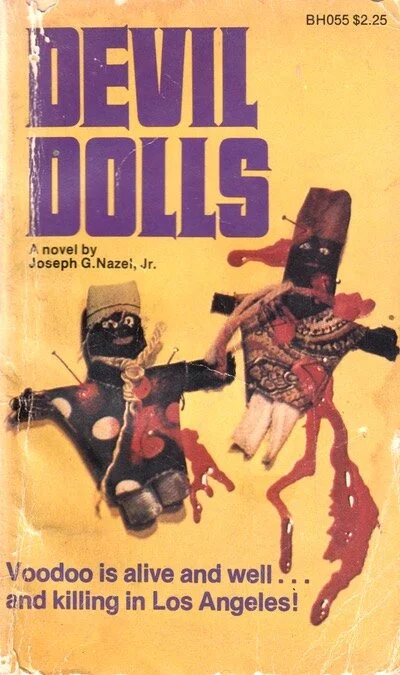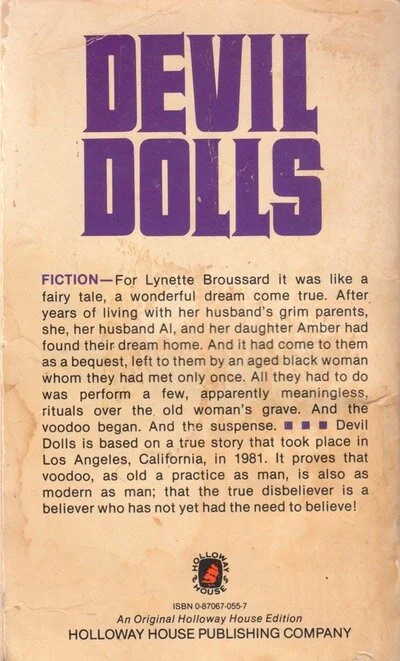From the author and the publisher behind The Black Exorcist comes Devil Dolls...the only Christmas book ever written in which demonic rag dolls stuff so much straw up a woman's vagina that her stomach swells to twice its normal size.
DEVIL DOLLS...where flayed cats are always the right gift!
DEVIL DOLLS...learn how much gin a pregnant woman can drink on New Year's Eve!
DEVIL DOLLS...discover that a man can be named Allison!
DEVIL DOLLS!...because even Satan needs a gift at Christmastime!
Holloway House was a down-and-dirty, corner-cutting paperback press out of Los Angeles, founded by two white publicists in the wake of the Watts Riots. The riots were a wake-up call for a lot of white Americans, and it woke these publicists up to the fact that there was a huge African-American audience who didn't have enough to read. Becoming an African-American imprint overnight, they published books by Donald Goines and Iceberg Slim with one hand, while ripping them off with the other. They published the first African-American porn rag, Players, and employed Joseph Nazel, a pistol-packing, whiskey-swigging, typewriter-pounder who cranked out novels in the time it takes most of us to eat a sandwich, writing quickie biographies of everyone from Thurgood Marshall to Richard Pryor.
Nazel was a good writer who wrote bad books because he didn't take the time to make them good. Holloway kept all their writers on a short financial leash, and Nazel needed to pay his rent. So while Devil Dolls is a huge improvement over The Black Exorcist, it's still padded, sloppy, and waxes and wanes with the attention span of its author. Holloway House's Hi-Kwality copy editing doesn't help: the book opens with a “Foreward” and the first paragraph contains the word “becuase”, before confusing “they’re” for “their," a mistake that recurs throughout the book.
Still, Devil Dolls is worth reading not just for the slice of early ‘80s African American life it presents (lots of hanging around in lounges and Richard Pryor references) but because inhabiting a woman's point-of-view frees Nazel from his compulsion to write with a cock-swinging swagger. His male heroes are all-too-often super-pimps who run massive brothels in Nevada protected by armies of female martial artists, or they're retired pimps turned preachers. Either way, they're always hard men who don't take nothing from nobody.
But Devil Dolls focuses on Lynetta, a put-upon mom who's been living with her husband (Allison), and daughter (Amber), at their in-law's house for five years. She's desperate for a place of their own, and furious at her reduced circumstances, trying not to take her frustrations out on Amber. When they find a white stucco house owned by an old woman named Mother Mary (whom they mistake for white at first), all the danger signs are there: the house is way undervalued and way overheated, it's crammed with Mother Mary's collection of black rag dolls, and she'll sell to them only if they perform a voodoo ritual involving eggs and scissors over her grave when she dies.
Lynetta's up against the wall and ignores every single one of these omens and signs her name on the dotted line. Rubbing it in, Mother Mary gives Amber a rag doll named "Mary" that Amber becomes instantly obsessed with and treats as if it's alive. Her grandmother, Thelma, a devout Christian, isn't having it:
“Just take that black thing away from her,” Thelma ordered from the kitchen. “I’ll put it out with the trash.”
Amber's upset, but they promise to get her a “better” white doll. That’s part of the crazy obvious dichotomy throughout the book: if something is black it makes Lynetta feel like it's dirty and poor, but if it's white, then she wants it so bad it hurts. Needless to say, the second they move into their new white stucco house, Lynetta begins having nightmares about the rag dolls stuffing her vagina with straw, and she wakes up pregnant. Weird old ladies begin to show up, wrapping dead, flayed cats in silver wrapping paper and tucking them under the front porch. Lynetta is freezing cold all the time and turns the heat up so high that the house turns into a claustrophobic swamp. She becomes convinced Amber's trying to drive her crazy with Mary the rag doll, and has to murder a demonic cat that tries to kill her.
People offer assistance (“Baby, I got some Valiums in my purse that’ll tighten you right up," her friend Reba says) but when they try to minister to her soul, Lynetta isn't having it.
“What do you believe?" Reba asked.
“I believe that you and everyone else is about to get on my last nerve,” Lynetta said.
They move into the house on Christmas, and Lynetta winds up in the hospital by New Year's Eve after trying to murder her family by turning on the gas while hallucinating (shades of Burnt Offerings) but then she breaks out of the hospital, guzzles gin and gets stoned with a horny cab driver, runs away from him, hits up Mother Mary’s grave, where she's attacked by a whole song and dance crew doing dirty voodoo rituals, spinning so much poultry around by the neck that when their heads snap off and their bodies sail through the air it seems to be raining dead chickens.
Lynetta is haunted and hunted, and her paranoia about voodoo and black rag dolls trying to drag her down to Hell and her vision of Los Angeles as a house of traps for an unwary black woman, is feverish, compelling, and deeply felt. But then it's like Nazel had to pick up his laundry or something, and the book races through the last chapters lickety split and just trails off into a lifeless lump of nothing. Things don't so much come to a climax as Nazel decides to stop typing.
But there are so many juicy nuggets before that happens: the “Foreward” lists bizarre voodoo deaths happening randomly all over the country, and each one is a tiny mini-movie in and of itself. In the first chapter, Lynetta sits down and reads a black newspaper's backpage ads for spiritualists and psychics and Nazel pretty much just copies the entire back page of a paper, turning his book into a funkalicious time capsule, and Lynetta really is a great character who doesn't have time for all this voodoo shit. Her idea of taking a stand is saying “So what?” to evil. But she's no dummy. When Allison makes fun of the egg n'scissors ritual they have to perform over Mother Mary's coffin, he demands that she explain why any of this silliness is necessary.
“Why do you Catholics spread all the incense around?” Lynetta erupts. “Why do you eat those little wafers? Ring those little chimes? Why does anybody who believes in something do whatever it is they do about what they believe?”
Whether it was by temperament or circumstance, Nazel never seemed to have the patience to really dig in and commit to becoming the singular pulp writer he could have been. But in Devil Dolls he gets awful close.

